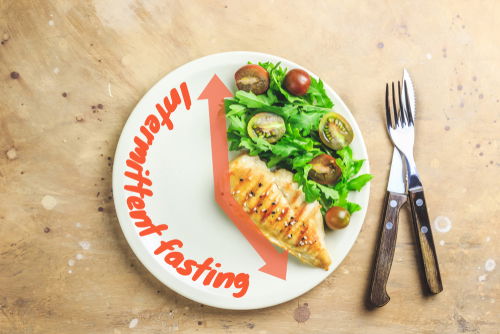Fasting Is Not a Dietary Plan

Contrary to popular belief, intermittent fasting is not a diet plan but rather an eating pattern. It means you have a designated period of time where you don't eat, followed by a smaller period of time where you eat unrestricted.
Intermittent fasting involves deliberately avoiding food and drink with calories for a specific period of time, usually hours or days. This temporary break from caloric consumption allows your cells to switch to burning stored fat for energy.
It is important to end your fasting periods carefully by reintroducing foods in small portions that are easy to digest. Avoid overeating or consuming junk food between fasting periods, as it can negate the benefits of the fast.
Intermittent fasting for weight loss has been a time-honored health trend for centuries. It has its roots in traditional fasting practices observed by ancient civilizations and religious groups. Although fasting isn’t for everyone, it is easy to try.
Pick Your Ideal Fasting Time Zone
Stick to your fasting and feeding window as best as you can, even a small snack can diminish the benefits of fasting. If you start slowly, you can gradually increase fasting periods. Discussed below are popular methods using different fasting zones, such as:
ALTERNATE DAY FASTING: Some people favor the simplicity and effectiveness of alternate-day fasting. Instead of constantly restricting your daily calories, alternate-day fasting allows you to indulge in your favorite foods every other day. Moreover, this approach to fasting has been shown to aid in weight loss, improve body composition, increase energy levels, and enhance mental clarity. If alternate-day fasting proves too restrictive, consider other forms that are easier to sustain.
WHOLE DAY FASTING: Whole day fasting requires you to fast one or two days a week by consuming no more than twenty-five percent of your daily caloric needs. You must include on eating day between fasting periods and should include high-fiber and high-protein foods, so you feel fuller with fewer calories. Engaging in a 24-hour fast once or twice a week can lead to calorie deficit and weight loss, but it may not be the best solution for you.
INTERMITTENT FASTING: Intermittent fasting for 10 to 16 hours can trigger your body to use stored fat for energy and may also promote a process (autophagy) that eliminates old or damaged cells and reduces harmful inflammation. However, it is still important to opt for nutritious meals like protein-rich salads, eggs with avocado, and wholesome vegetables, and watch portion sizes to avoid overeating.
Your body was basically built to handle fasting zones and responsible fasting is not considered a cause of nutritional deficiencies. If you do experience symptoms like anxiety or nausea, it’s important to stop and reevaluate your fasting zones.
Fasting Can Reduce Calorie Intake
It's worth noting that fasting for a day without food can come with side effects such as dizziness and headaches. Plus, after breaking a fasting, there is a possibility of regaining lost weight. In the end, most report feeling better following a fasting lifestyle. When you eat less than your body requires, your metabolism temporarily slows down causing symptoms such as dizziness, headaches, fatigue, low blood sugar, and irritability.
While fasting has many benefits, reducing overall calorie intake may be just as effective. Different fasting approaches work for different people, and it may take time to find what works best for you. Some people adapt to the routine and even enjoy it. Intermittent fasting is popular with people who find it helpful for managing appetite, weight, and overall well-being. However, it may not be suitable for everyone and make sure you eat enough to fuel your body and prevent muscle loss.
Whether you’re interested in jump starting your journey using the latest compounded weight loss medication or would like to implement a responsible fasting method to shed pounds, Metabolic Research Center has over three decades of experiencing in helping clients meet their goal for healthy living.
By submitting this form, you agree to receive marketing text messages from us at the number provided, including messages sent by autodialer. Consent is not a condition of any purchase. Message and data rates may apply. Message frequency varies. Reply HELP for help or STOP to cancel. View our Privacy Policy and Terms of Service.

